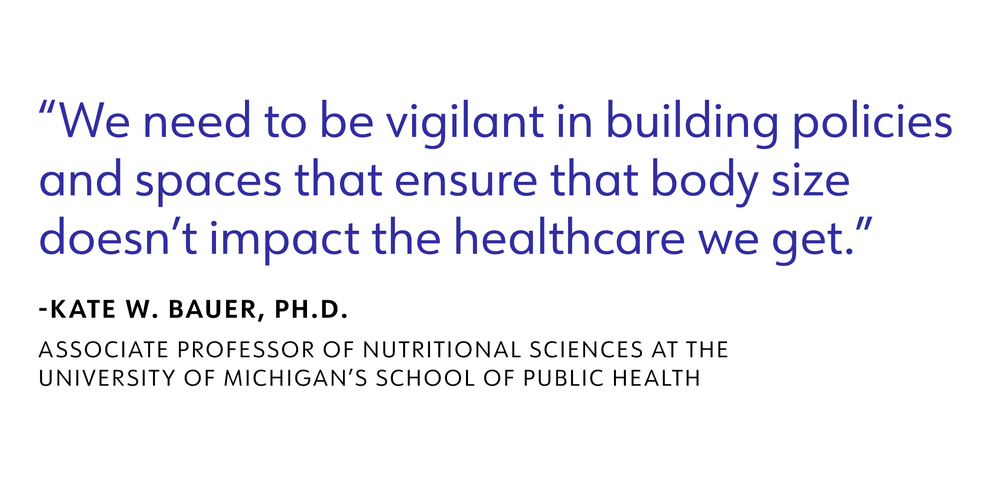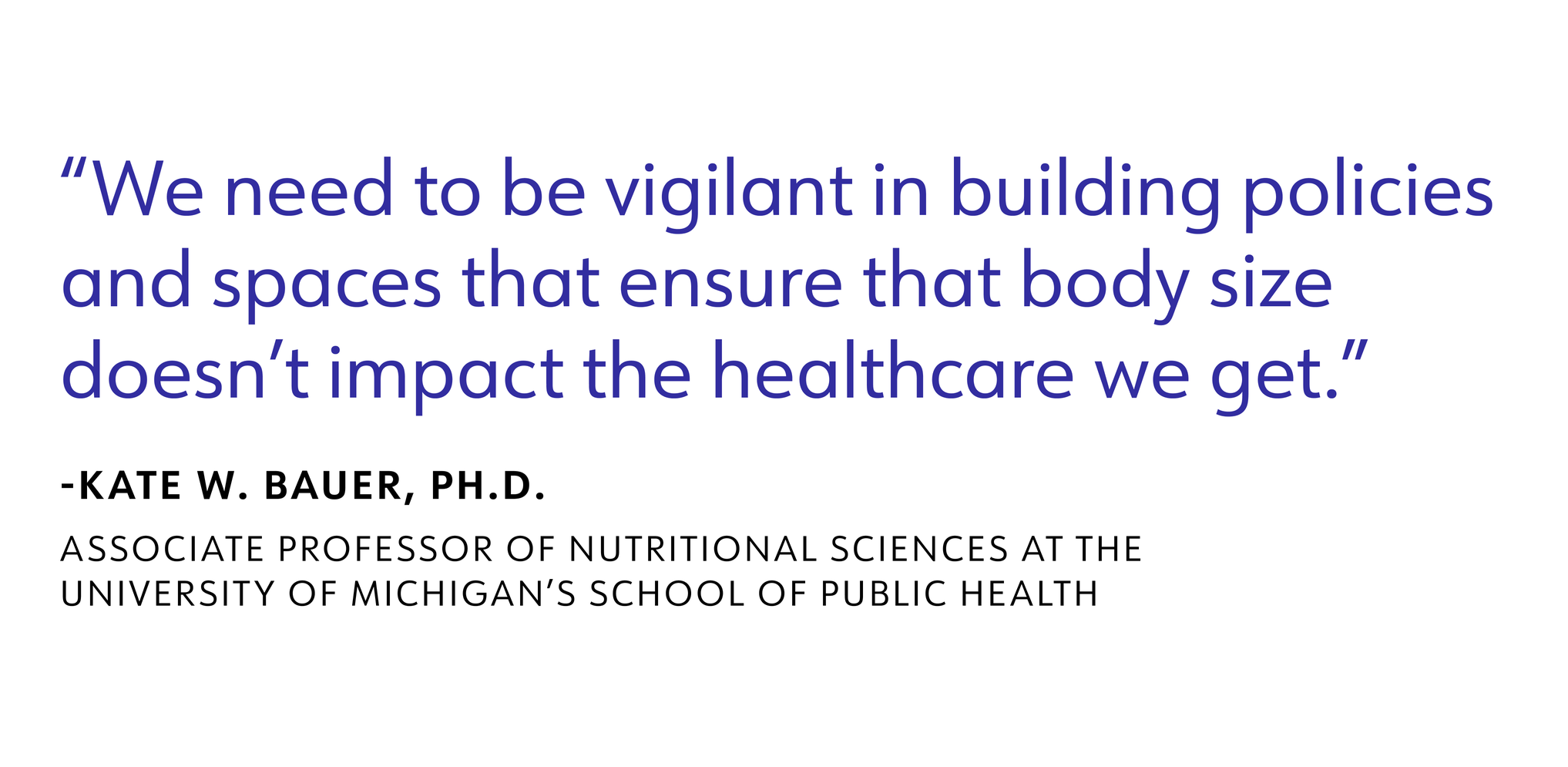We need to talk about obesity


Diabetes. Heart disease. Obesity. Out of all of those chronic conditions, only one feels like it shouldn’t be said out loud (or that if you label someone as having it, you’re being insulting). But obesity deserves to be a part of our vocabulary like any other chronic condition. That’s because by treating it as a word to be embarrassed about, we deny its meaning and reinforce the damaging stigma surrounding it. Here’s how we got here.
The origins of the term
To see how the word “obesity” became so loaded, you have to go back. Way back. Larger bodies have always existed — there are depictions of them that date to the Stone Age — but higher weights weren’t necessarily attached to any negative meaning, says Kate W. Bauer, Ph.D., associate professor of nutritional sciences at the University of Michigan’s School of Public Health. “Whether we view fatness as positive or negative depends on the context — being heavier is better in times when food is short; it is a sign of wealth and prosperity in many cultures.”
But for Western cultures, things started shifting in the early 17th century, when the word obesity — from the Latin obesus, which means fat, stout, or plump — began being used in the medical community to describe fatness and was seen as a negative trait by the general public. “Among Europeans, being larger was purposefully linked by eugenicists as being a feature of non-white individuals (particularly Africans and enslaved African people), and thus meaning you’re less civilized,” says Bauer, who goes on to say that this link between obesity and other “less civilized” cultures is what has driven a lot of our viewpoints on weight today. “People also started linking obesity to poor health,” says Bauer. There was a belief that heaviness was a sign of sinful excesses like alcohol and overeating.
The connection between obesity and laziness, lack of willpower, and slovenliness arose as white individuals gained sufficient resources and power and wanted to separate themselves from other “lesser” populations, adds Bauer. Over the last 200 years or so, this stigma has remained, with the word “obesity” pointing to some sort of moral and personal failing.
How obesity is interpreted today
Because many people make assumptions about others based on appearances, people with obesity are often seen — whether consciously or subconsciously — as having negative traits. For example, a 2009 study found that when a thin person is lying down watching television, people assume they’re resting. But when someone with overweight or obesity is seen relaxing, they’re viewed as lazy and unmotivated.
This starts young, too. In a classic study performed in the late 1950s, 10- and 11-year-olds were shown six images of children and asked to rank them in the order of which child they liked best. The six images included a child of normal weight, one with obesity, one in a wheelchair, one with crutches and a leg brace, one with a missing hand, and another with a facial abnormality. Across six samples of varying social, economic, and racial/ethnic backgrounds, the child with obesity was ranked last.
The danger of the obesity stigma
All that negativity comes at a cost. Weight-based stigma can impact people’s day-to-day life—such as while commuting and in the workplace — and also harm their physical health. It can lead to an increase in a variety of health issues: stress, blood pressure, chronic inflammation, diabetes, cardiovascular disease, anxiety, depression, low self-esteem, and disordered eating behaviors, including binge eating.
A 2018 report found that experiencing weight bias and stigma can be as harmful to a person as the effects of obesity itself. “Research has shown that for patients with higher BMIs, doctors spend less time with the person, have less patience with them, take them less seriously, provide less health education, and are less likely to perform certain interventions and screenings, including pelvic exams, mammograms, and cancer screens,” says Alissa Rumsey, MS, RD, a New York City-based dietitian and author of the book Unapologetic Eating.
This can keep people with obesity out of doctors’ offices. “People with higher BMIs often put off going to the doctor because, when they do go, they experience weight stigma and often receive substandard medical care,” says Rumsey. “In fact, many experts believe that weight stigma may explain some of the health differences we see in people with higher body weights.” One thing that can help: Seeing a provider who is trained in compassionate, stigma-free care, like those at WeightWatchers.
The stigma is rooted in deep bias. “If we didn’t believe that higher weight was an indication that an individual was lazy, sloppy, or had poor control, we wouldn’t discriminate against them,” says Bauer. “We need to be vigilant in building policies and spaces that ensure that body size doesn’t impact the healthcare we get. I think this will be driven a lot by younger generations and their increased desire for diversity in race, ethnicity, culture, gender, and more.”
Unfortunately, body size is often left out of anti-discrimination laws. At the moment, only Michigan has state-wide protection against weight-based discrimination, though research shows people are highly supportive of these anti-discrimination laws.
What obesity really means
As common as it is for people to link obesity with a lack of willpower, there is so much more at play. “Your weight is not just based on eating less and moving more,” says Bauer. The factors that lead to obesity are complex and multifactorial and can include things like genetics, environment, sociocultural factors, and hormones. Nutrition, physical activity, and other lifestyle factors play a role, however not as large of one as many may think.
How the term is changing
It’s hard to believe, but it’s only been a decade since the American Medical Association officially recognized obesity as a disease. Since that happened in 2013, the medicalized meaning has led to a shift in how the term is used. Did you notice that all of the above refers to people with obesity as opposed to people who are obese? That’s intentional. These days, many healthcare providers and advocacy organizations are turning towards what’s known as person-first language, which means that instead of saying someone “is obese” they are “a person with obesity.”
This is an approach that has been adopted for a range of health-related and psychological conditions to avoid labeling or defining people by their medical condition, writes Rebecca Puhl, Ph.D., a clinical psychologist, and the deputy director for The Rudd Center for Food Policy & Health at the University of Connecticut in her 2020 review titled “What words should we use about weight?” “It’s an important part of efforts to treat people with respect and to help reduce stigma.”
In 2025, another key shift in language occurred. A group of 58 obesity experts proposed new definitions for obesity, distinguishing pre-clinical obesity (excess body fat that doesn’t impact health) and clinical obesity (excess body fat that does impact health). It’s a move that mirrors the diagnosis of a condition like diabetes — which has prediabetes and diabetes stages — and calls for obesity to be taken more seriously as a real disease.


How GLP-1s are changing the game
Helping further move the needle of making “obesity” a more neutral word: GLP-1s, which are the newest weight-management medications to hit the market. These drugs (semaglutide, liraglutide, and tirzepatide), are incredibly effective, helping people lose up to 20% or more of their weight according to research in The New England Journal of Medicine. “These medications are changing the belief that obesity is a character fault or that someone with obesity just doesn’t have enough discipline,” says Dr. Robert F. Kushner, M.D., professor of medicine and medical education at Northwestern University’s Feinberg School of Medicine. “They show there is some biological basis for obesity.”
Kushner says what’s happening now reminds him of what occurred with mental health treatment decades ago. “People used to say to someone with depression, ‘why don’t you just feel happier and pick yourself up,’” Kushner says. “All of a sudden medications became available that helped people function, feel better, and have a higher quality of life. It changed the conversation about mental illness, and these GLP-1 drugs are doing the same thing with obesity.”
Nowhere is this change more evident than in the doctor’s office. “It used to be that my patients would ask me how to lose weight in a ‘natural’ way — they thought they should be able to do it themselves,” says Kushner. “But now they want these medications. They see the dramatic weight loss and realize they need help. It’s not a subtle shift in what I’m hearing; it’s a dramatic shift.” This mirrors the shift away from losing weight to fit into a certain size and towards doing it for weight health, which is the weight at which you feel your best and healthiest.
For anyone interested in weight-loss medications, talk with your healthcare provider to learn more about whether they are a good fit and potential side effects. And remember that medications work best when paired with a weight-loss program, like what you’ll find with WeightWatchers GLP-1 Program. That kind of pairing will help you focus on healthy habits and stay motivated each step of the way.
The bottom line
As much as the word “obesity” has been linked to negativity in the past, there are signs that this is changing. The medical community now uses obesity as a diagnostic term, research shows that it is not caused by something as simple as a lack of willpower, and new highly effective drugs are helping prove there’s a biological basis for the disease. Advocates hope that all of this will help obesity be viewed more neutrally — just like how diabetes, high blood pressure, and other health conditions are seen.
This content is for informational purposes only and does not constitute medical advice, diagnosis or treatment. It should not be regarded as a substitute for guidance from your healthcare provider.
WeightWatchers relies on only the most trustworthy sources, including highly credentialed experts, government and academic institutions, peer-reviewed studies, and respected medical associations. We focus on primary sources and research that is recent, relevant, and high-quality. For more about how we report, write, and fact check our stories, please see our editorial policy.
